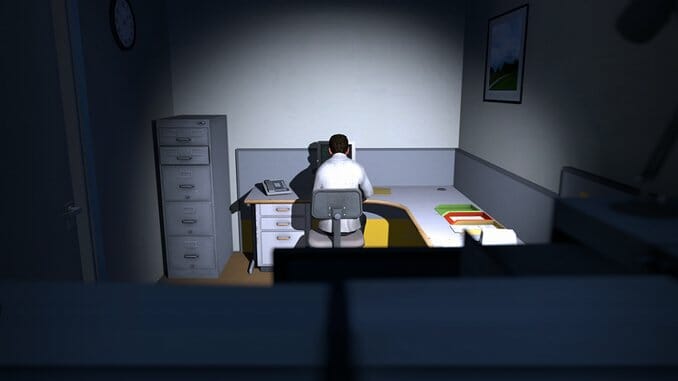The Stanley Parable (PC)

I’m writing this review on a Sunday night bus from Rochester, New York to New York City. Just now, two hours after our departure, we stopped in Syracuse to pick up some more passengers. I had the opportunity to leave the bus, but I opted against it in order to work on this review. I’m pretty hungry, and if my trip to Rochester was any indication there won’t be another stop until we reach Manhattan in about five and a half hours. Going by the signs on the outside of the Syracuse bus station/rest stop thing, I was strongly tempted, tempted to the core of my being, to buy a big gross Subway sandwich and a big gross Dunkin’ Donuts coffee, but duty called.
The more refined people reading this might question my taste in food. More well-traveled readers, by contrast, might wonder what the hell I was doing in Rochester, and/or recognize a Subway/Dunks combo as well above par for a bus station dinner. Everyone in this equation would be correct. There are several ways of looking at my predicament (such as it was) and several ways of looking at why I acted the way I did. All of those ideas are equally valid in their respective contexts. The Stanley Parable is a video game about that. Sort of.
Ways in which The Stanley Parable is like Dunkin’ Donuts or Subway:
• It is designed to be enjoyed in short bursts.
• It contains deep, strange intricacies that only become clear over repeated experiences.
• Explaining those intricacies, rather than encouraging people to seek them out, will fail miserably at doing them justice.
• It capitalizes on people’s ability to make what they think are frivolous spur-of-the-bq. moment judgment calls (See: Shrugging and thinking “What the hell” as they turn into a DD drive-thru), but are actually engineered well in advance by people who thoroughly understand patterns of human behavior as they relate to playing videogames, caffeine consumption or banana peppers.
This bus ride, like a Subway location, The Stanley Parable and the life of The Stanley Parable’s protagonist (that is: Stanley), is a pretty tightly closed system, which is another way of saying that, for the seven-and-a-half hours I’m at Megabus’ mercy, there aren’t many ways for my fellow riders and me to exercise free will. Megabus limits us because, in order to continue as a functioning bus company, they need civilized paying passengers (which I guess by bus standards means, like, not shooting up in the bathroom or getting into a fistfight). For that same amount of time, and about equally badly, I need Megabus to comply as a reasonably-priced way to get me back to New York City in time for work in the morning.
There’s a unique, often codependent relationship between a system and its users, and buying into any type of system (taking a crowded, horrible-smelling bus; working a stifling, repetitive office job; going to a chain restaurant) often means giving up some free will in favor of convenience and safety. Suffice to say, this is all pretty complicated and dry to the point of being better conveyed sideways through The Stanley Parable and its web of surreal little stories about a man and his braindead office job.
(Granted, using a videogame to meta-comment on closed systems, their users and everyone’s desire for agency has already been done by Bioshock, but The Stanley Parable is about four times shorter and about a hundred times funnier than Bioshock. Additionally, The Stanley Parable comes across like its writers have read at least a couple of books about free will and morality, so my vote goes toward Bioshock and The Stanley Parable being able to coexist.)
-

-

-

-

-

-

-

-

-

-

-

-

-

-

-

-

-

-

-

-

-

-

-

-

-

-

-

-

-

-

-

-

-

-

-

-

-

-

-

-









































